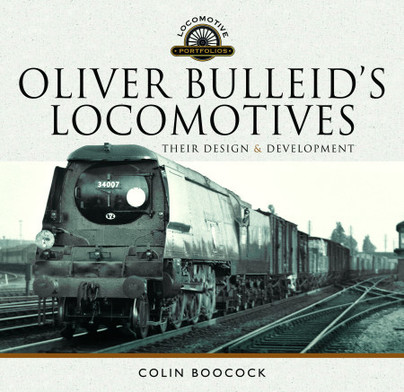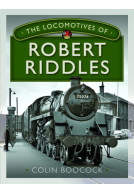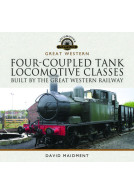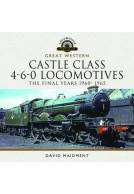Oliver Bulleid's Locomotives (ePub)
Their Design and Development
Imprint: Pen & Sword Transport
Series: Locomotive Portfolios
File Size: 85.8 MB (.epub)
Pages: 224
ISBN: 9781526749246
Published: 2nd November 2020
| Other formats available - Buy the Hardback and get the eBook for £1.99! | Price |
|---|---|
| Oliver Bulleid's Locomotives Hardback Add to Basket | £22.50 |
Oliver Bulleid’s locomotives guides the reader in the quest to understand what motivated Mr Bulleid in his work as a senior engineer and manager, and tries, with as little bias as is reasonable, to make sense of some of the more controversial aspects of his activities. For example, why did OVB not pursue the ideal of a 2-8-2 for the Southern Railway? How did the ‘Leader’ project go so much out of control? What role did Bulleid play in the massive dieselisation programme in Ireland when he was CME there? How did the 0-6-6-0T turf-burning steam locomotive fit in with Ireland’s traction policy, or did it? And why did ninety of his steam locomotives and ninety-four of ‘his’ diesels have to be rebuilt to make them either more economical or more reliable?
These are fundamental questions to which the book provides the reader with answers based on the author’s experiences or on those of people who knew Bulleid. OVB’s undoubted successes are illustrated in words and photographs, too, to provide a hopefully balanced picture of one of Britain’s more exciting railway engineers.
The book merits space on any railway enthusiast’s bookshelf. Good value and highly recommended.
Rail Advert
4.9 / 5
Read the Full Review Here
"Southern Railway fans will find this book fascinating but many more will enjoy it."
ENGINEERING in MINIATURE - November 2021
"This book is a well written overview of the Bulleid era, by a competent engineer who can express himself in layman’s terms."
Martin Shill, Industrial Railway Society
Written by a professional engineer who spent much of his early career at Eastleigh and Brighton, this book has considerable authority. He worked with J. G. Click and R. G. Jarvis, and had experience of Bulleid's work, which extended far beyond his steam locomotives, although the Pacifics are perhaps his best-known design. A significant part of the book therefore deals with diesel and electric locomotives.
The Railway Observer May 2021
Introductory chapters dealing with the Southern Railway as Bulleid found it, and the main characters are followed by those dealing with each design. These include those he inherited such as the Southern Q Class and CIE's earliest diesels. The troublesome Crossley diesels are described with due credit to the Metro-Vick electrical equipment and to the Inchicore engineers who rebuilt them to give long lives. As well as the leader, there is a chapter about the Turf-Burner.
Generally sympathetic towards the rebuilding of the Pacifics, the author was involved in its financial justification which showed a slight advantage. However, he criticises the additional balance weights on the coupled wheels, whose hammer-blow was noticeable in his office at Eastleigh. Several Bulleid features were included in the BR standard designs, but the author regrets the omission of electric lighting. Your reviewer, similarly, has long been surprised at the failure to use Boxpok-type wheels, which are lighter and support the tyres better.
The only questionable statement involves the D1 and E1 4-4-0s, credited with outside admission valves; the only diagram found, in Holcroft's Locomotive Adventure, casts doubt. Photographic reproduction, sometimes leaving something to be desired, is here beyond reproach, most of the illustrations being unfamiliar.
The book deserves a place on the bookshelf of every student of locomotives, especially Bulleid's By current standards, it is good value, and it was a pleasure to examine it.
A fresh and pretensioned work.
Miniaturas JM
Read the full review here
Last word goes to a friend. I lent him the review copy - he liked it so much he bought the book. Can’t recommend better than that!
The Society of Model and Experimental Engineers Journal, June 2021
All of the chapters in Boocock’s work are liberally illustrated using a very fine selection of black and white and colour images which have reproduced well on the book’s gloss art paper. A number of line drawings and technical tables are included to support the text, and appendices relating to CIE’s diesel tendering process and the disappointing reliability of their fleet in 1958 are provided.
West Somerset Railway Association
This is an outstanding work which brings together all the disparate threads linking the locos designed and built under Bulleid’s oversight in both Britain and Ireland, and is highly recommended.
Colin Boocock has produced a well-written and illustrated addition to the Bulleid book list.
Bulleid Express, Winter 2020-21
Bulleid and his steam locomotives remain matters of controversy and this book may not appeal to those whose loyalties lie other than at Eastleigh or Inchicore; but for ‘Southerners’ on either side of the Irish Sea it should prove worthwhile reading.
Tenterden Terrier (Col. Stephens Railway Museum)
Review by Roger Backhouse
York Model Engineers newsletter
Last word goes to a friend. I lent him the review copy - he liked it so much he bought the book. Can’t recommend better than that!
Pen and Sword have produced yet another superb book – excellent, well-written text, high-quality paper, and a superb collection of photographs. Highly recommended.
Ffestiniog Railway Magazine
About Colin Boocock
COLIN BOOCOCK is a retired railway officer whose career, mainly in mechanical and electrical engineering, spanned forty-one years full-time work on British Railways and Railtrack and a further twelve or so years in part-time consultancy.
His career started at Eastleigh Works on the Southern Region, where he was trained in the late 1950s, later going on to work at railway establishments in all of BR’s original Regions including spells in Scotland and Wales, mainly managing the maintenance of locomotives and rolling stock at a senior level.
As a life-long railway enthusiast, he travelled widely on Britain’s railways but always had a keen interest in the developments on what he still regards as his ‘home railway’, the South Western.
This volume describes in some detail the railway he grew up on: the South Western, its main lines, key railway centres and the fascinating myriad of secondary routes and branch lines.























